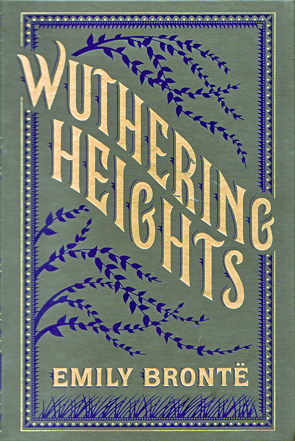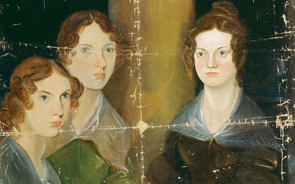I cannot live without my life! I cannot live without my soul!
- Heathcliff
I think this is a book that most people have heard about, are maybe even familiar with the plot, even if they haven’t read it. The story is so well known that Kate Bush used it as the basis for a smash hit single. The names Catherine and Heathcliff have become synonymous with passionate but doomed lovers. What girl wouldn’t want the dark and brooding Heathcliff? Well, actually, that would be any girl with any sense, because Heathcliff is far from being a romantic hero of the small ‘r’ variety. He is a bitter and twisted man, one fixated upon revenge and on destroying everyone at Wuthering Heights and Thrushcross Grange.
I think this idea of the ‘perfect love story’ between Catherine and Heathcliff is echoed in the more recent pairings, such as Bella and Edward (Twilight), Anastasia Steele and Christian Grey (Fifty Shades of Grey) or even Harley Quinn and the Joker Batman comics. They are all pairings which are presented as glorious passionate romances, but are actually abusive and destructive relationships.
If I’d read this story as a 16-year-old goth girl, I’d probably have a different idea of the story. But I came to it much older than that, and all I could see was what terrible people Catherine and Heathcliff were, along with every other character in this story. There wasn’t a single character in this book that I liked. They were all selfish, self-centred, thoughtless, cruel, spoiled, arrogant, vindictive, snivelling, whiny, narcissistic sociopaths.
The basic story is simple – Catherine’s father finds an abandoned child, Heathcliff, and brings him home to Wuthering Heights to raise. Catherine and Heathcliff grow up together, caring for little else but each other. They meet the wealthy and gentle children, Edward and Isabella, from nearby Thrushcross Grange and initially despise them for their gentleness and timidity. They grow older and Catherine decides to marry Edward, for the wealth and social position the marriage will give her. Heathcliff runs away after overhearing half of a declaration from Catherine that she could never marry him because it would degrade her. He doesn’t stay to hear her also declare her love for him, with her my love for Heathcliff resembles the eternal rocks beneath—a source of little visible delight, but necessary. Nelly, I am Heathcliff
(p.79).
Catherine and Edward marry, and have a calm and peaceful life. Heathcliff returns after three years, wealthy from an undisclosed source. His return disrupts the peaceful world Catherine now inhabits. He swindles Catherine’s brother Hindley out of ownership of Wuthering Heights and marries Edward’s sister Isabella to both hurt Edward and Catherine and to eventually gain control over Thrushcross Grange.
Catherine dies, 18 years pass, and Heathcliff is still obsessed with Catherine, seeking out her ghost which he believes haunts him. He is also still hell-bent on destroying everyone and having his revenge.
All of this makes it sound like I did not enjoy this book, but that is wrong. I actually found it a very enjoyable read, and I’m glad that I have finally read it. It was full of wild gothic angst. The setting is incredibly isolated from a modern viewpoint – everything happens at the two properties owned by the families. Occasionally we hear of a character going elsewhere, such as to church, but those outside trips are never part of the narrative. All is contained to Wuthering Heights and Thrushcross Grange, remote from all contact with the rest of the world. There is wild passion, there are ghosts, there is a dark and foreboding manor house, there are even hints of incest and necrophilia. What more could you want from a novel?
The ‘love story’ that is the centre of this book is passionate but obsessive, and is really more of a horror story than a romance, drawing upon the Gothic strain of Romanticism that became popular with novels like The Monk and The Mysteries of Udolpo . Catherine and Heathcliff’s emotions are twisted by the admittedly abusive upbringing they had, and neither escape their obsession with each other.
Heathcliff’s declaration of I cannot live without my soul
echoes that earlier declaration of Catherine’s of I am Heathcliff
. Together they present an idea that nothing else in the world matters to either of them but their desire to be together forever. It is unrelenting and ultimately unfulfillable, and ends up destroying both of them.

 RSS Feed
RSS Feed Facebook
Facebook Instagram
Instagram YouTube
YouTube Subscribe to our Newsletter
Subscribe to our Newsletter



No one has commented yet. Be the first!